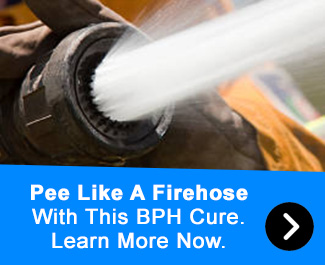1. Blood In Urine
LEARN MORE NOW
Prostate Problems? Top Urologist Reveals Proven Treatment You Can Do At Home. SEE IT
Professor: "Mind-Blowing Enlarged Prostate-Reducing Secret Changed My Life". SEE IT
Top Doctor Reveals Potent All-Natural Solution To Stop Prostate Problem Progression. SEE IT
100% Natural Prostate Reduction Remedy Allows Men To Pee 2.5X Faster. SEE IT
Doctors Warn: Beware Of Prostate Drugs. Do This Proven Natural Remedy Instead. SEE IT
Blood in the urine or hematuria is caused by an enlarged prostate gland that can put pressure on the urethra. This can irritate the affected organ and cause it to become inflamed. It can eventually cause bleeding that shows up in the urine.
Other factors that can cause blood in the urine in BPH include urinary tract infections, kidney stones, and prostate biopsies.
Treatments And Care
If left untreated, BPH may lead to bladder blockage or incomplete emptying. Although these symptoms vary in severity, they’re usually triggered by other factors.
BPH can also affect your sex life. Enlarged prostate conditions are known to cause a reduction in sexual drive and satisfaction. It also can cause ED or erectile dysfunction.
In rare cases, the patient may notice blood in the urine, although this is an unusual symptom and is usually caused by something else.
Below are various BPH treatments, remedies, and care you should know about.
21. Supplements
Supplements for enlarged prostate generally use plant-based ingredients, including saw palmetto. They can reduce prostate enlargement and improve urine flow. Another popular supplement for BPH is beta-sitosterol.
Beta-sitosterol is a plant sterol with a structure similar to cholesterol. It is present in foods such as nuts, seeds, and vegetables. Eating fruits is one good way to increase the intake of beta-sitosterol.
20. Diet
Dietary changes are essential to improve prostate health. A diet that consists of vegetables, fruits, beans, and whole grains can help reduce the risk of developing an enlarged prostate.
Some foods, especially fish, contain “good” fats that do not trigger inflammation, unlike saturated animal fats. On other hand, it’s best to avoid processed foods, spicy foods, and artificial sweeteners. Reducing salt and sugar intake can also help treat BPH.
19. Active Lifestyle
An active lifestyle can significantly reduce the risk of developing prostate issues. Choosing the right exercise program is critical for prostate health. It’s best to avoid exercises that cause too much pounding or jarring.
Prolonged sitting must also be avoided as this can put pressure on the enlarged prostate. An active lifestyle has numerous benefits, including muscle and bone strength, weight management, and improved mental health that can help treat BPH.
18. Exercises
Prostate Problems? Top Urologist Reveals Proven Treatment You Can Do At Home. SEE IT.
Professor: "Mind-Blowing Enlarged Prostate-Reducing Secret Changed My Life". SEE IT.
Top Doctor Reveals Potent All-Natural Solution To Stop Prostate Problem Progression. SEE IT.
100% Natural Prostate Reduction Remedy Allows Men To Pee 2.5X Faster. SEE IT.
Doctors Warn: Beware Of Prostate Drugs. Do This Proven Natural Remedy Instead. SEE IT.
Exercise is a proven way to improve prostate health and reduce pain. It is recommended that patients perform at least three hours of aerobic exercise per week. This should be done at a brisk pace and is designed to avoid the stress and strain that can exacerbate the condition.
Power walks can improve the flow of urine and reduce the progression of prostate cancer. These exercises can be tailored to suit your needs, and you can also use apps to monitor your activity levels.
17. Manage Stress And Anxiety
Managing stress can help treat enlarged prostate. Stress can make the body produce the hormone, adrenaline, which can narrow the urethra. This makes it difficult for urine to pass.
Emotional therapy, such as yoga and meditation, can help prostate patients manage stress and lower their anxiety levels. Social support is also helpful to reduce anxiety.
16. Avoid Alcohol And Caffeine
Caffeine and alcohol are diuretic substances that constrict the bladder and irritate the prostate. Alcohol can exacerbate an enlarged prostate since it hinders the prostate muscle from relaxing. This makes it hard for the urine to pass, which eventually can contribute to urinary incontinence.
Caffeine in coffee can increase urinary urgency and frequency, as well as cause irritation and pain.
15. Avoid Drinking Too Much Water At One Time
In order to help reduce the symptoms associated with BPH, it is best to drink smaller amounts of water at regular intervals. Avoiding drinking too much water, particularly after dinner and before bedtime can prevent the individual from going to the bathroom often.
An individual with BPH finds it difficult to urinate. Hence, frequent visits to the bathroom will be burdensome. Drinking smaller amounts of water will increase the individual’s ability to go longer between bathroom trips.
14. Empty Out Of Bladder Right Away
Holding pee is a bad habit and can have negative consequences. Leaving the bladder un-emptied can result in a number of health issues, including kidney stones.
Holding pee can also lead to urinary tract infections, which can be extremely dangerous. It’s best to empty out the bladder soon as the urgency to pee is felt.
13. Regular Bathroom Schedule
It’s recommended to keep a regular bathroom schedule to empty out the bladder. Going to the bathroom every 2 to 4 hours can help even if there’s no urge to pee.
An enlarged prostate may cause bowel symptoms like frequent or infrequent bowel movements. Keeping a regular schedule can also boost bowel movements to avoid constipation.
(continued next page)
Prostate Problems? Top Urologist Reveals Proven Treatment You Can Do At Home. SEE IT.
Professor: "Mind-Blowing Enlarged Prostate-Reducing Secret Changed My Life". SEE IT.
Top Doctor Reveals Potent All-Natural Solution To Stop Prostate Problem Progression. SEE IT.
100% Natural Prostate Reduction Remedy Allows Men To Pee 2.5X Faster. SEE IT.
Doctors Warn: Beware Of Prostate Drugs. Do This Proven Natural Remedy Instead. SEE IT.


